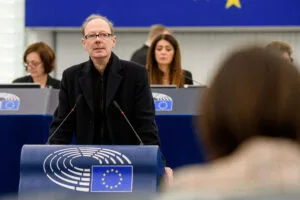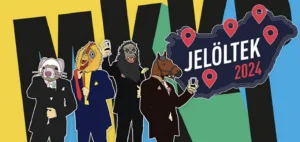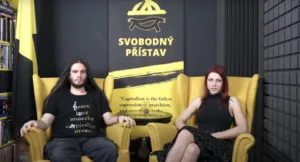Brussels – In the 2024 European elections, people will be able to vote for the tabby cat party, the Motorists party or the party pushing for better relations between the European Union and aliens. These are some of the weirdest and most provocative parties that will show up at the ballot box in some of the EU member states (only citizens of those countries will be able to vote for them) between June 6 and June 9 to try an unhoped-for climb to the Brussels institutions or much more simply to point out some shortcomings of national systems and policies and of the European Union itself.

In Germany, Die PARTEI (‘The Party’), where PARTEI stands for ‘Party for Labor, Rule of Law, Animal Protection, Promotion of Elites and Grassroots Democratic Initiative’, will stand for the third time in a row in the European elections after its 2019 exploit. Founded in 2004 and able to elect its leader, Martin Sonneborn, twice to the EU Parliament (as well as stand-up comedian Nico Semsrott in 2019, later to leave in 2021), the most famous and unproductive satirical party in the entire Union is seeking a new assertion at the ballot box with a series of provocative proposals: short-haul flights “only for birds and insects, and for Commission President von der Leyen, who will be able to continue flying between Brussels and Strasbourg, e per Taylor Swift“, brake on the price of beer and kebabs, two atomic bombs for Europe (“we proposed it molto prima di Katarina Barley“), return to East and West Germany, “European foreign policy should be based on relevant values: Euro, Dollar, Rubles, D-Mark.”
Also, in Germany this year, people will be able to vote for the Party for Conventional Medical Rejuvenation Research (Partei für schulmedizinische Verjüngungsforschung), which promises to support the faster development of rejuvenation therapies “that repair the damage of ageing” and with which people can live healthy “for thousands of years.” The electoral programme for the 2024 European elections points to allocating “40 billion euros of the EU budget per year” for this purpose, directing the Horizon Europe program to rejuvenation research and creating a European Institute for Rejuvenation Research.
In Sweden, however, the Evil Chicken Party (Ond Kyckling Partiet) returns after the legislative elections in 2022, whose major goal is to demonstrate the excessive ease of party registration in the country, but also to denounce the too-high (at 4 per cent) barrier threshold for smaller parties. Although it presents some policy proposals—such as copyright law reform, Internet freedom, and opposition to censorship—the Swedish party electoral program warns voters that “we will not be able to make a difference.”

The one born from a satirical perspective but would now like to make a difference in Hungary and Europe is the Two-Tailed Dog Party (Magyar Kétfarkú Kutya Párt), founded in 2006 in the city of Szeged (and officially registered in 2014) to make fun of the traditional parties and now running with candidate Marietta Le for a seat in the EU Parliament. While the hopes for a weakening of Viktor Orbán‘s regime resides more in the ex-Fidesz challenger, Péter Magyar, the Two-Tailed Dog Party highlights with irony several Hungary’s problems with the EU, such as migration policy, climate, and the economy: “We want to deal with the really important things, like making beer free in Western Europe, but of course, we also deal with unimportant things like emigration or immigration.”
Speaking of animals, in the Czech Republic, the Tabby Party (Mourek), founded as a satirical—but not too much—political formation for the betterment of the capital city of Prague and now running for a seat in the EU Parliament with a programme based on climate, transport, migration, the euro and veto rights, is coming up for election. Attempting to exploit voter distraction will be the A Better EU with Aliens party, which will stand under the acronym ‘Ano’ just like the more structured political formation of former prime minister Andrej Babiš. The election proposal is focused on the end of the war (in Ukraine) and fighting inflation, but what catches the eye is almost only the fact that its 23 candidates for the European elections show up everywhere dressed as aliens.
Among the strangest parties around Europe that will compete in the 2024 European elections is the United Cypriot Hunters’ Movement, a conservative formation that proposes sustainable hunting of animals and the preservation of the natural environment in Cyprus, but which at the same time opposes same-sex marriage, describing it as “against human nature”. But also the ultra-conservative Motorists Themselves (Motoristé sobě) who in the Czech Republic have allied themselves with the eurosceptic Přísaha populists to reverse the course of the Green Deal and ban the sale of petrol and diesel cars from 2035.

The Czech Republic is a receptacle for parties that are bizarre but also pose pressing issues for the entire European Union. For example, the Don’t Vote Urza.cz (Nevolte Urza.cz) party proposes everything that Brussels is trying to disincentivize—non-participation in voting—and, inspired by anarcho-capitalist ideas, rejects any political function, rejects the role of the state in the market, and claims that it will renounce any mandate it receives in European or national elections. On the other hand, a similar role in Spain, but with a different goal, is embodied by Empty Seats (Escaños en blanco), which is standing for the first time in European elections. The only article in the electoral programme is the one about “not getting into office,” not working as MPs, and not accepting any public remuneration if elected: “With this programme, we wish to make visible and make effective, through the corresponding empty seats, the will of voters who are dissatisfied with the current representative system.”
Finally, another unique party in France, albeit one linked to a more structured cultural tradition, is presenting itself for the fifth consecutive time. Esperanto common language (Espéranto langue commune) is once again pushing a single-issue campaign to get the planned language developed between 1872 and 1887 included in the list of 24 official languages of the Union. The election programme—obviously written in Esperanto—proposes “an easy-to-learn neutral language for a more democratic Europe” since “the institutions of the EU function almost exclusively in English” and in this way “, the European population is cut off from its leaders.”
English version by the Translation Service of Withub






![Un campo coltivato [foto: imagoeconomica]](https://www.eunews.it/wp-content/uploads/2025/04/campo-coltivato-120x86.png)